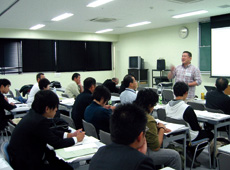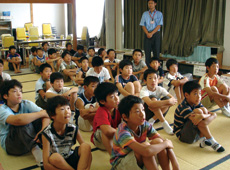TOP >
Special > Space Education Enriches Children's Heart


Q. How would you like to see space education develop in the future?

Space education leaders seminar
Five years has passed since the establishment of the Space Education Center, and the number of inquires from educators and the number of seminar participants is increasing every year. However, the visibility of space education is still low nationwide, and we need to raise its profile.
So, we made the slogan "Local community raises the children of own community, and we are expanding our hubs that can provide space education independently in each community.
For instance, we make arrangement with local school boards, science museums and universities, those can function as hubs in their areas, then the Space Education Center will help their training instructors.
It is impossible for the center to cover all schools across the country on its own, as its manpower is limited. But if we have such hubs all across the country, educators in each community can play leading role in promoting space education, and we can expect year-round activities there. We would like to build a support system to implement this vision.
Q. What is the next target of the Space Education Center?

Children attending a space education class
In recent years, Japan's space technology has been highly valued around the world, by the completion of the Japanese Experiment Module Kibo on the International Space Station, and the success of the H-II Transfer Vehicle e.t.c.. The technology and achievements of Japan's space program will continue to grow, and they will contribute in many ways worldwide, and I am sure Japanese children will proud of that. Some of children will dream of getting a space-related job when they grow up.
Thus, space development can inspire children to have dreams and hope, enriching their hearts and minds. And I believe that space education has the same impact on children, since it brings them the knowledge and technology accumulated through space development.
So, the Space Education Center will continue to make efforts to promote and improve space education, in order to inspire children and enrich their hearts and minds.
Hideo Nakamura
Director, JAXA Space Education Center
Mr. Nakamura graduated from Chiba University majoring in science education, in 1971. After working for two years at Nippon Telegraph and Telephone Public Corporation (now NTT), he became a teacher at Seishi Middle School in Kita ward, Tokyo in 1973. He later taught at other middle schools in Tokyo, and served as a principal of Ebara Daiichi Middle School in Shinagawa ward, Tokyo until 2008. In 2005, he was appointed director of the Japan Association for Science Education for Middle Schools (he still remains there as an advisor). He has also served as a committee member of the board of education and the Ministry of Education, Culture, Sports, Science and Technology, as well as a board member of a research association for science education. In 1987, he received an academic award from the National Federation of Educational Research Organizations of Japan. He has published many research papers and books about science education. He is an advisor of the department of education at the National Museum of Nature and Science, Tokyo. He also has a first-class amateur radio operator license for Japan. He has been in the current position since 2008.


